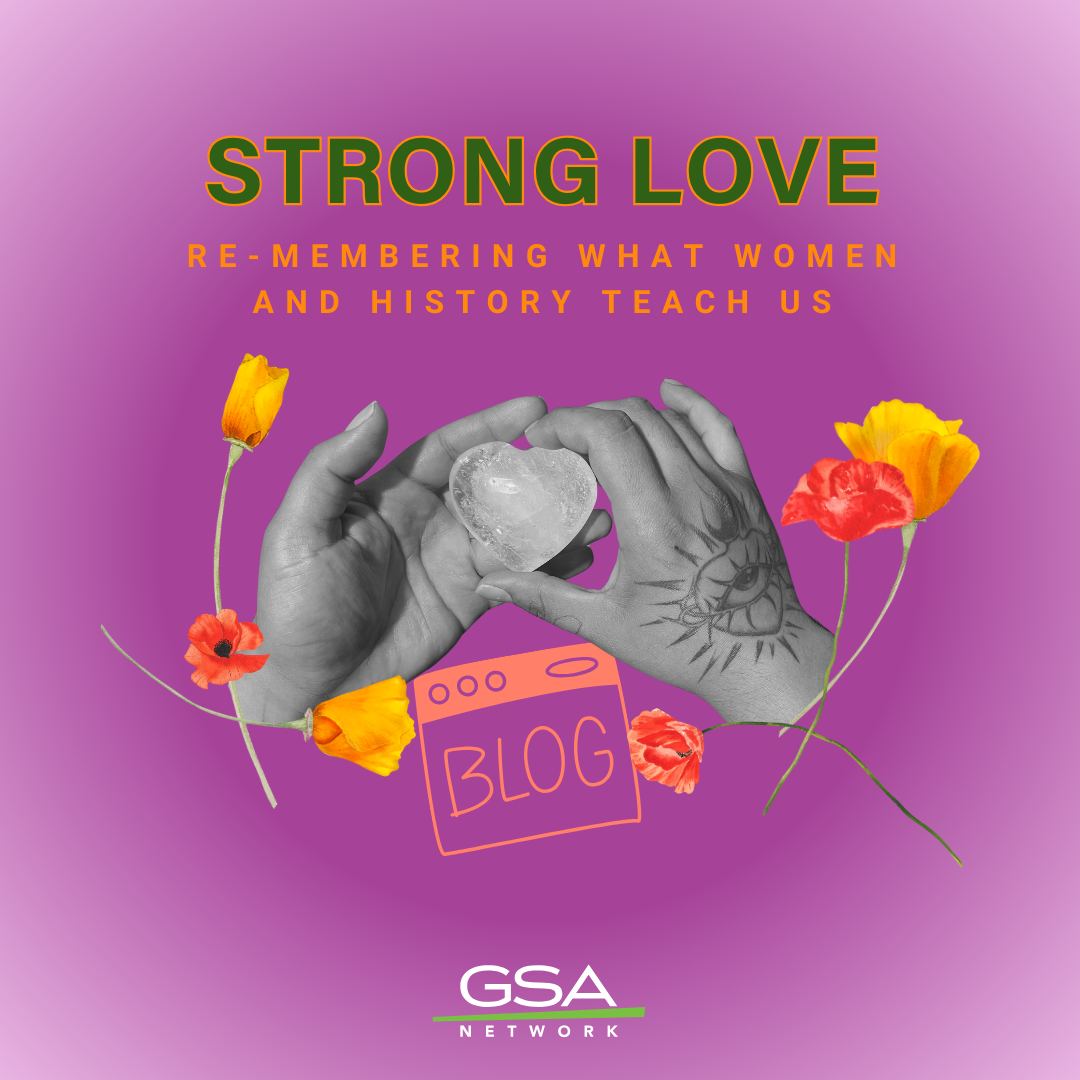
By Juniperangelica Loving, GSA Network Co-Executive Director
The more I learn from women’s history, the more I am convinced that strong, loving #girlslikeus¹ have always existed and will continue to exist. Within that learning, I’ve often wondered why they chose the path of perseverance, only to find myself in a parallel position, choosing to forge ahead against all patriarchal odds. As we move through moments of violence, grief, and political theater with a persistent audacity to shape our own futures, it is necessary to bring what we’ve learned from the past forward—particularly when it comes to humanitarian principles that have actively sustained us. We can and must re-member our histories and the possibilities they create.
Trans, queer, and Two-Spirit people (TQ2S+) have always embodied the spirit of limitlessness. To our country and beyond, that embodiment is an ideological threat to the binary status quo. In an attempt to mitigate this threat, the state has methodically attempted to erase the unique personhood and potential of TQ2S+ young people with tools of oppression. These tools can be direct, like physical violence, and indirect, like the targeting of trans youth through hateful legislation. It is a tactic of destabilization through psychological and economic insecurity. TQ2S youth know this all too well. Existing within this level of harm threatens society with soul-loss² and hopelessness. While these challenges often are overwhelming to even think about, history promises us that we are capable of doing what needs to be done.³ What will be necessary to get through is the collective strengthening of heart, spirit, and mind. Grace Lee Boggs called this “stretching our humanity.”
Strong love is the commitment required to witness and interrupt injustices while refusing to surrender our shared humanity. We understand this fact intergenerationally, not just the suffering that leads to protest, but the kind of gut-deep strong love that is necessary to pull ourselves together enough to try. Strong love is what it takes to care for ourselves and our people when our humanity is discarded.
We Can Remember
We (humans) have survived by taking care of each other within the community. Although care networks have historically sustained us, the act of caregiving (and those who perform it) is devalued (culturally) and disrupted (systematically). Western capitalism “works best” when people are seen as labor, stripped of humanity, and led into a forced forgetting of self (re: connection to the community) in service of industry. The impacts of this dissociation are beyond 9-5. People and personal connections (sometimes in the form of unions) are community power.
Surviving homelessness throughout middle and high school quickly taught me how my family’s humanity was perceived as non-existent when we were on the street and needed more help than we could pay back. Still, I reached out for help and released any shame that came with receiving support. I am grateful that I did.
It is our right to re-claim our humanity. Being near community allows us to reflect on what that can look like. All humans, especially TQ2S+ young people, deserve the opportunity to learn foundational stories of their ancestral lineages. Being taught early in life that we are capable of living and being coached to try is what helps young become grow into whole adults. This is not only the ability to make do with what we have (surviving) but also getting to imagine what surviving makes possible.
Reading the written works of women like bell hooks has helped me put words to my memory. In All About Love, how love is defined as “the will to extend oneself for one’s own or another spiritual growth” taught me a kind of love that set me free, not trying to box me in. Maybe I hadn’t yet seen a love like that in my world, but her words helped me believe it could be… that I could learn to love myself like this.
We Must Remember
It makes sense that many of us would struggle to understand and embody strong love if most of us haven’t experienced love in its weakest form or free from abuse. For many of our parents and their parents, meeting the family’s material needs like housing and food were the closest forms of care experienced, if that. But we (humans) are more than students or workers, more than citizens or individuals. Even if our U.S. culture is limited in view/focus, we must see wider/deeper. We must learn from our collective past, witness for ourselves, and make our own sense of the world; then, we choose to love strong. We can start to do this through acceptance and gratitude for what is and what can be. History is full of TQ2S+ women and people who have shown us what full lives can be lived when we accept our whole selves and enjoy the process of becoming.
My favorite moment to remember from my time living on the streets was an afternoon in a Southern California park. My mother and I lay side-by-side on the grass, waiting for my dad to figure out how we’d pay for that night’s motel room. We had nowhere to go, yet we were able to make each other laugh like never before. The ugliness of economic oppression lived alongside the beauty of connection. To exist within that reality is queerness in practice.
Gratitude feels like love spilling out of me.
I’m reminded of the Haudenosaunee⁴ Confederacy Thanksgiving Address, an Indigenous witnessing of the universe and all of its un-contained love. For over 500 years, native communities of Turtle Island (aka the United States and its colonies) have met persistent genocide and brutality with relentless love for Earth and Spirit. Two-Spirit relatives show us that queerness & transness is an aspect of the universe that is both inescapable and expansive, and —like true love, it is freeing. To embody that knowing is a gift, the fuel powering my choice to continue on, and for that, I am grateful, and in that gratitude, I move closer to understanding my (our) assignment.
We can and must lead with strong love and care for self & community in order to grow into our power and responsibility. We can and must reject the idea that there is only fear and hopelessness. We can and must consider “hope as a discipline.”⁵ In the way we’re trained to grind for pay, we can and must be in the practice of devising a future full of cared-for communities.
Admittedly, this assignment feels most ambiguous in the worst of times; when sh*t hits close to home, and everything around me starts to feel unknown or when I believe that liberated love exists, but I’ve yet to feel it, even still, alongside numbing fear there is a deep sense of knowing. The knowing (trust or hope, faith, prayer, dreams) is what kept me going even before I was able to read through my first book by bell hooks. My strong love for life and my commitment to freedom are why I persevered as a younger queen. It is a strength that is queer, intuitive, traditional, and rooted in the fabric of the universe.
Women’s History Month is an invitation to more than commemorating icons. This re-membering of who we come from, who we are, and who we are becoming is how we keep our humanity. We are fighting for our humanity to be witnessed (at the least) and cared for (at the most). Learning who we come from helps us not question what they (we) have historically been forced to self-question as women.
Our resistance is not only an act of defiance but a testament to our ability to bloom even after the harshest winters. It’s in this shared resilience, powered by unwavering love, that we find the courage to persevere through life’s most challenging transitions.
As we witness the arrival of spring, I’m inspired by the reminder that this is not just a moment but a movement—a collective awakening to the possibilities that are us. Now is (y)our time.
#####
Footnotes:
¹#girlslikeus was created by Janet Mock to support and raise visibility for transgender women. It symbolizes community, representation, and solidarity within the trans community.
²Grace Lee Boggs (2003) discusses “soul-loss” in the context of societal challenges, emphasizing the need for collective renewal and transformation.
³Angela Davis. “You have to act as if it were possible to radically transform the world. And you have to do it all the time.”
⁴The Thanksgiving Address is the central invocation for the Haudenosaunee (aka the Iroquois Confederacy-Mohawk, Oneida, Cayuga, Onondaga, Seneca, and Tuscarora). It reflects their relationship of giving thanks for life and the world around them. The Thanksgiving Address is reprinted in Robin Wall Kimmerer’s Braiding Sweetgrass.
⁵Mariame Kaba, Project NIA founder
